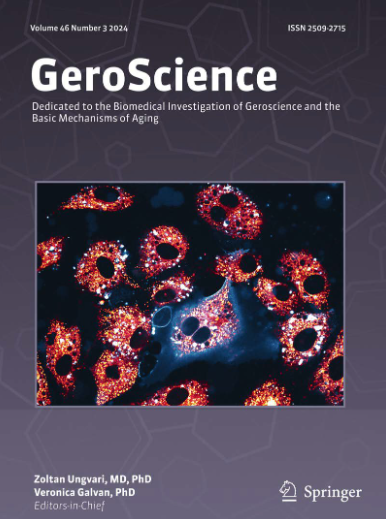Low protein-induced-FGF-21 signaling remodels adipose tissue on reduced markers of senescence during aging.
IF 5.4
2区 医学
Q1 GERIATRICS & GERONTOLOGY
引用次数: 0
Abstract
Cellular senescence and metabolic impairment occur during aging, with adipose tissue decline playing a key role in this process. Furthermore, the detriments of aging on adipose tissue function are further exacerbated by obesity. Dietary protein restriction (DPR), without reducing calorie intake, protects against age-related metabolic decline and extends lifespan through the metabolic hormone FGF21. Here, we demonstrate that protein restriction significantly decreases pro-oncogenic and senescence-related markers in adipose tissue, including SASP, Cdkn1a Cdkn1a, and SA-βgal staining. Additionally, mice fed a low-protein diet during diet-induced obesity demonstrated significant decreases in tumorigenic and cell cycle markers compared with mice fed a control protein and high-fat diet, suggesting that a low-protein diet decreases the burden of cellular senescence on adipose tissue in aged mice and aged obese mice. Conversely, mice lacking FGF21 failed to exhibit the benefits of protein restriction on markers of senescence in white and brown adipose tissue. These data demonstrate that protein restriction exerts distinct beneficial effects on white and brown adipose tissue remodeling on senescence and other markers associated with improvements in lifespan and particularly health span. Given the negative impact of cellular senescence on adipose tissue, protein restriction offers a potential dietary intervention to prevent the detriments of cellular senescence on adipose tissue function during obesity and aging.低蛋白诱导的fgf -21信号在衰老过程中通过减少衰老标志物来重塑脂肪组织。
细胞衰老和代谢损伤发生在衰老过程中,脂肪组织的衰退在这一过程中起着关键作用。此外,肥胖进一步加剧了衰老对脂肪组织功能的损害。饮食蛋白质限制(DPR)在不减少卡路里摄入的情况下,通过代谢激素FGF21防止与年龄相关的代谢衰退,并延长寿命。在这里,我们证明了蛋白质限制显著降低了脂肪组织中的促癌和衰老相关标志物,包括SASP、Cdkn1a、Cdkn1a和SA-βgal染色。此外,与喂食对照蛋白和高脂肪饮食的小鼠相比,在饮食诱导肥胖期间喂食低蛋白饮食的小鼠显示出肿瘤发生和细胞周期标志物的显著降低,这表明低蛋白饮食减轻了老年小鼠和老年肥胖小鼠脂肪组织细胞衰老的负担。相反,缺乏FGF21的小鼠在白色和棕色脂肪组织的衰老标记物上没有表现出蛋白质限制的好处。这些数据表明,蛋白质限制对白色和棕色脂肪组织重塑、衰老和其他与寿命改善有关的标志物,特别是健康寿命,具有明显的有益作用。考虑到细胞衰老对脂肪组织的负面影响,限制蛋白质提供了一种潜在的饮食干预,以防止细胞衰老对肥胖和衰老过程中脂肪组织功能的损害。
本文章由计算机程序翻译,如有差异,请以英文原文为准。
求助全文
约1分钟内获得全文
求助全文
来源期刊

GeroScience
Medicine-Complementary and Alternative Medicine
CiteScore
10.50
自引率
5.40%
发文量
182
期刊介绍:
GeroScience is a bi-monthly, international, peer-reviewed journal that publishes articles related to research in the biology of aging and research on biomedical applications that impact aging. The scope of articles to be considered include evolutionary biology, biophysics, genetics, genomics, proteomics, molecular biology, cell biology, biochemistry, endocrinology, immunology, physiology, pharmacology, neuroscience, and psychology.
 求助内容:
求助内容: 应助结果提醒方式:
应助结果提醒方式:


